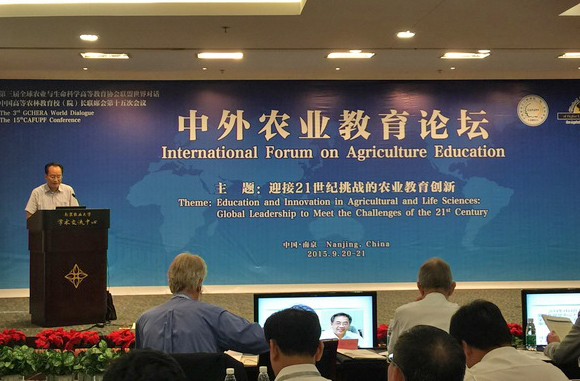Educational innovation needed to revitalize agriculture

The International Forum on Agriculture Education, themed “Education and Innovation in Agricultural and Life Sciences: Global Leadership to Meet the Challenges of the 21st Century,” was held at Nanjing Agricultural University from Sept. 20 to 21.
The International Forum on Agriculture Education, themed “Education and Innovation in Agricultural and Life Sciences: Global Leadership to Meet the Challenges of the 21st Century,” was held at Nanjing Agricultural University from Sept. 20 to 21. Scholars discussed agricultural education as it relates to global grain and food security.
Growing demand
With the acceleration of globalization, the agriculture and food industries of all countries are increasingly linked, and the universal character of such issues as grain and food security is becoming more prominent. Currently, global agricultural development is facing challenges in terms of resources, talent, environment and climate. Issues related to agriculture, grain and food have become common human topics.
Dong Weichun, vice-president of Nanjing Agricultural University said that China should put more stress on scientific development in agriculture to meet the demands of food security and food supply, with its limited arable land, shortage of professional farmers and prominent regional differences.
Great changes have taken place in the demand structure of China’s agricultural products. Ke Bingsheng, president of China Agricultural University, said that the growth of demand outpaces agricultural production, and people increasingly emphasize food quality.
Important mission
Paul Singh, a professor from the University of California, Davis (UC-Davis), asserted that issues, including food security, should be addressed through better production technology and more outstanding agricultural professional talent, which has endowed agriculture education with an important mission and put forward higher requirements.
Max Pfeffer, associate dean of the College of Agriculture and Life Sciences at Cornell University, said that higher agricultural education should bear the important mission of making scientific agricultural knowledge and technology accepted by society through talent cultivation, teaching and scientific research to raise the agricultural production level.
Ke said China’s agricultural universities are currently falling behind with regard to scientific research as well as the recruitment of students and faculty. However, some major ones have made rapid progress in those aspects with the help of the government and through their own efforts.
Differential development
Helene Roberts Dillard, dean of the College of Agricultural and Environmental Sciences at UC-Davis, said that agricultural universities and research institutions should constantly improve education and research modes, provide short-term training courses for agricultural personnel, and intensify cooperation with global universities and scientific research institutions. “We should focus on important issues in human life, such as nutrition, life health and environment, and push forward the upgrading of agricultural development through teaching and scientific innovation,” Dillard said.
“Agricultural education at different levels should achieve differential development,” Dong said, adding that research universities should aim to conduct high-level agricultural scientific research and cultivate professional talent. Application-oriented universities should focus on talent cultivation and meet local demands, Dong said, while agricultural vocational universities should cultivate a new type of professional farmers. At the same time, agricultural training institutions should be aimed at extensively advancing rural education and popularizing agricultural scientific and technological knowledge, he said.
Paul Vlek, a professor from the University of Bonn, Germany, said that boundaries separating economic, life and human sciences should be broken, and comprehensive interdisciplinary research should be encouraged. He said that different types of universities should actively cooperate to jointly cope with universal problems in agriculture and contribute to social development.
Wang Guanglu is a reporter at the Chinese Social Sciences Today.

 PRINT
PRINT CLOSE
CLOSE